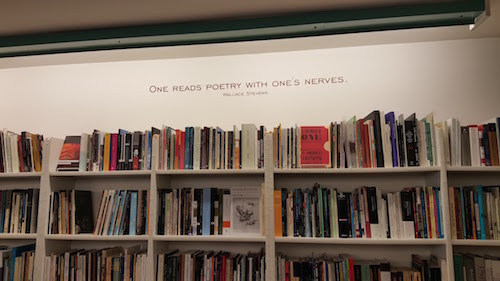Open Books owner John Marshall is in the "closing stages" of selling the shop to a new owner

As the Seattle Review of Books reported back at the beginning of March, John Marshall, owner of the Wallingford poetry-only bookshop Open Books, announced that he was retiring from the bookselling business. In an email to his customers, Marshall indicated that he wanted to sell the bookstore, that sales at Open Books were still strong, and that he believed a new owner could even make something more of the store.
So, one month after the announcement, how does Marshall feel? “Overwhelmed, tired and ecstatic in different degrees at different times,” he says. Marshall and I are sitting in the back room at Open Books just after closing time, talking about the response the store has received. He says within a day and a half of sending the e-mail to the Open Books list, he already had more than 30 offers to purchase the store in his inbox. “Most of [the offers] were well-meaning and thoroughly ill-thought out, and that’s fine,” Marshall says. “People’s hearts are very large organs, but their bank accounts may not be” as large.
“We’re deep in conversation with somebody who I think would be a terrific owner,” Marshall says.
Marshall was completely bowled over by the love that Open Books has received in the past month. “The chagrin and the love and the number of queries about buying the store was absolutely overwhelming — way more than I expected. It’s hard to understand how you’re perceived when you’re on the inside,” he says. It reminded him that “there is a lot of affection for Open Books.” He adds that, sales-wise, “there’s no shot in the arm like saying you’re on the way out.” March sales ended 60 percent above March 2015, which is of course wonderful news, but which adds a whole other difficulty to the process of screening for new owners: Marshall has to keep up with ordering new titles to make up for all the books that are being bought. It’s undoubtedly a good problem to have, but it still takes up time.
So, uh, how’s the sale of the bookstore going? Is there going to still be an Open Books after Marshall retires? “We’re deep in conversation with somebody who I think would be a terrific owner,” Marshall says. He describes the process of the sale as in the “closing stages,” and while he declines to name the prospective owner until all the paperwork is signed, he says the talks entered “lawyer-land” a couple weeks ago, and that she gave her blessing for Marshall to mention the progress in an interview with the Seattle Review of Books.
Marshall describes the prospective new owner of Open Books as “a very regular customer and a very passionate person about poetry, a very thoughtful person about poetry, and a kick to be around. I like her a lot.” He says that he never considered her as a possible buyer of the store, but she was the first person to get in touch with him when he made his announcement. It’s been moving steadily forward ever since. “As well as the talks were going, I was sure I was going to to say something stupid” and ruin the whole thing, Marshall says, but that moment hasn’t happened yet: “last weekend, all sorts of dollar figures were being exchanged.”Now, he says, “I’m much calmer about it, but I still knock on wood. Don’t fuck with the gods — they will turn on you in a moment.”
The idea of Open Books continuing with someone else at the helm excites Marshall. He looks forward to the reinvigoration that a new, younger owner will bring to the store. “I think the internet could be used more as a sales tool and as a medium,” Marshall says. “I grew very tired of throwing readings,” he says, but “I think going back to a reading a week” would probably be advisable. “Reaching out to a broader customer base with the mighty internet” is important, “but getting more bodies in the building” is essential. “I hope the next owner brings community with her, and I’m sure she will.”
Marshall has been thinking a lot about the idea of founder survival, the idea of an institution growing beyond its originator. “If there’s a model — and I really don’t know jack shit about it — I fancy Allan Kornblum, who ran out of Iowa City a very wild press called Toothpaste Press which went on to become Coffee House Press. And then when he retired he moved it along so that the next person was in place for a while and then he stepped aside and he continued to be associated with it.” Does that mean Marshall envisions some kind of a relationship with the bookstore in the future? “To whatever extent it’s valuable, I hope to be connected with Open Books moving forward,” he says.
Open Books is the Seattle Review of Books Bookstore of the Month for April. Every Monday this month, we’ll be talking with Marshall not just about the future of the bookstore, but about its legacy and history, too. More than just about anyone else in Seattle, Marshall has had a front-row seat for Seattle’s poetry scene over the last two decades. It’s an incredible legacy — one that will hopefully continue for years to come.